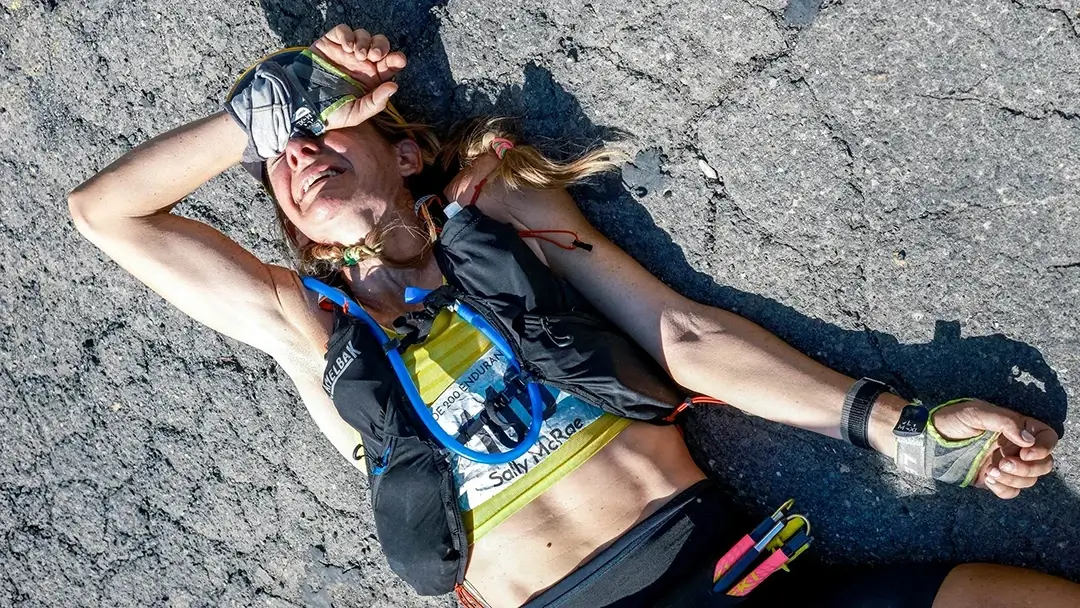15 Bucket List Marathons Every Runner Should Do in 2026
Discover 15 of the world’s most epic marathons scheduled for 2026 flat, fast, scenic, and packed with camaraderie. Set your sights on these bucket-list races and plan your next adventure!
Vomiting, hallucinations, and total exhaustion couldn’t stop Sally McRae from finishing third in one of the toughest 200-mile ultras. Here’s how she pulled off the comeback of a lifetime.

Ultrarunning isn’t just a battle with distance it’s a confrontation with your limits, both physical and mental. For elite ultrarunner Sally McRae, the Tahoe 200 was one of her hardest challenges yet, pushing her far beyond anything she’d faced before.
The race came with everything you don’t want: unbearable heat, relentless nausea, vomiting that lasted for hours, and even hallucinations. Still, she pressed on step after painful step.
This wasn’t just a test of fitness. It was a test of identity, resilience, and grit.
And through all of it, McRae clawed her way to an incredible third-place finish.
Even more impressive? She did it by learning how to surrender to the process and embrace the chaos.
From the very beginning, McRae had one goal in mind: a podium finish. “I was ready to do whatever it took,” she said before the race.
And at first, she was executing that plan perfectly. Through the opening 30 miles, she was locked in a tight duel with another top woman, running strong and feeling confident.
But things changed fast.
By mile 31, her body began rebelling. Dizziness, nausea, and labored breathing crept in. “This wasn’t nerves. It felt like my energy was being drained out of me,” she recalled.
By mile 62, her body was in full shutdown mode. She couldn’t keep down any food or even water. “I hadn’t eaten in eight hours. I was throwing up everything,” she said.
But quitting? That was never on the table.
“It wasn’t if I’d finish it was how I’d figure out the problem.”
Her crew became essential at this point. Her pacer Billy, steady and composed, kept her focused. “This is what you do,” he told her. “You suffer. You overcome.”
Between miles 63 and 100, the focus shifted to survival. She dealt with extreme sleep deprivation and the emotional weight of watching other runners pass as she lay in a cot, recovering.
Progress was slow and painful. Every move was calculated cooling her body, tending to blisters, trying to eat. And most of all, resetting her mind.
“I realized if I wanted to finish well, I had to let go of the race I imagined,” she said. “I had to be okay with what it was becoming.”
At mile 130, the race shifted.
Temperatures dropped, and her body started cooperating. Her crew told her a female runner ahead was only 30–40 minutes up the trail.
That sliver of possibility ignited her.
“I thought, why not go for it? Nothing’s perfect right now anyway,” she said. “The pain didn’t stop. The fatigue was still there. But the mindset flipped.”
With Billy pushing beside her, she tapped into raw emotion turning frustration into fire.
“Use it,” he told her. “Be pissed. That’s power.”
They surged ahead, now chasing runners, not the clock.
With just 15 miles to go, McRae made the pass that locked in third place. But her tank was empty. She started hallucinating talking to trees, blacking out, unsure of what was real.
Still, she refused to stop.
“I had nothing left. But I kept asking for more,” she said.
She finished not with strength, but with sheer will.
“I thought I was failing for 100 miles,” she admitted. “But it was in that failure that everything changed.”
Crossing the finish line, she grinned and raised her arms.
“Third place, baby. I’ve never been prouder of a finish in my life.”
It wasn’t perfect pacing or ideal fueling that got her there it was resilience.
The kind that says: adapt, suffer smart, keep going even when your body screams no.
McRae’s journey is packed with wisdom for any runner, no matter the distance:
In the end, this race was never really about pace or splits.
It was about choosing to rise, again and again even when it felt impossible.
“Maybe it wasn’t the race I hoped for,” McRae said. “But it was the race I needed.”
And the best part? She never stopped trying.
Start your running journey today!
No spam. Cancel anytime.